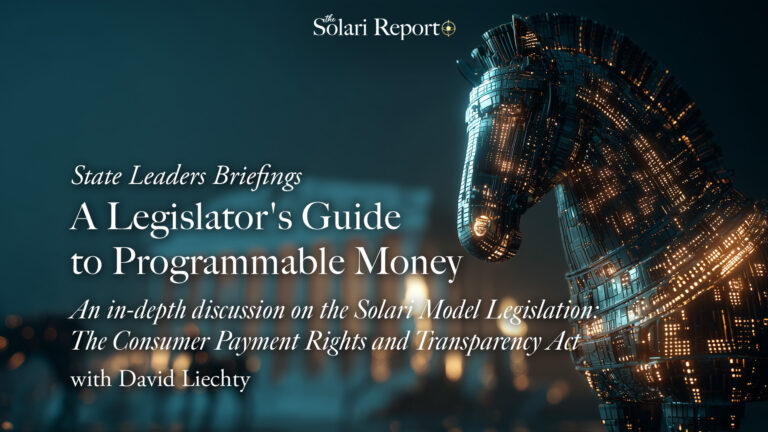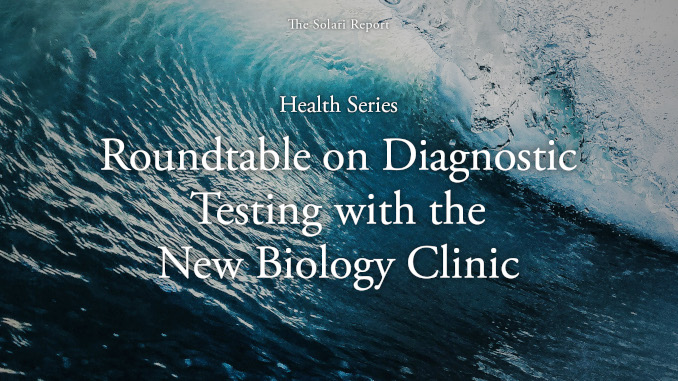A Short Preview:
“Nature alone cures. [W]hat nursing has to do … is to put the patient
in the best condition for nature to act upon him.”
~ Florence Nightingale

Already a subscriber? Log in
New to the Solari Report? Check out our Welcome Page
Not a subscriber yet? Subscribe now
With a Solari Report subscription, you get access to:
- ✔ The popular and informative Money & Markets show co-hosted by Catherine Austin Fitts and John Titus
- ✔ Weekly interviews with top guests, and quarterly deep dives into major trends affecting you day-to-day
- ✔ Aggregation of the most relevant news stories
- ✔ Subscriber-only events and a digital platform to connect with other subscribers





















































































































I’m not a flat earthed either, but I empathize with you, Jennifer. Great interview.
I’m not a flat earthed either, but I empathize with you, Jennifer. Great interview.
Dependency is Evil
Excellent presentation Jennifer. Thank you so much for getting this out more broadly. One diagnostic test I was hoping you would cover is blood pressure. Is high blood pressure a lie just like high cholesterol? Can you recommend any books or articles on the subject?
Thanks,
Jeff
Jeffrey,
Yes! There were so many questions on my list, I didn’t get to the most basic of them all…the blood pressure readings!!! Luckily, Dr Cowan has written a lot about blood pressure in his book, “Human Heart, Cosmic Heart” (see link above) and his website. I put a link to an article of his below.
In my opinion, I think that Blood pressure readings are a non-invasive tool that can let us know how our the blood is flowing through the body. From what I understand from The New Biology approach, a high reading means the body is compensating by tightening the blood vessels to increase the abnormally weak flow of blood. Mainstream medicine is focused on the reducing the pressure via drugs and surgeries. The New Biology wants to increase the flow of the blood with good nutrition, various supplements, body movements etc…and the body will fix the higher pressure on its own.
“Normal” Blood pressure readings have actually gone down in the past few decades. (Personally, I think it’s because they want us to all be on beta blockers). Anything over 100 systolic plus the patient’s age and the diastolic (bottom) number was over 90, it was considered high. Now it’s anything over 130/85 for an extended period of time.
People usually get a BP taken while they nervously sit in a doctor’s office and stare at the machine! That is a higher than your average BP reading, Guaranteed! Then, before you know it, that high reading and a 5-10 min visit with your doctor, you could get placed on a heart medication Rx for life!
That is why a good health history including nutrition, symptoms, lifestyle etc…is so important. The numbers are just a tool, not the key to health.
FYI: I am not a fan of taking blood pressure using those cuffs at Walmart, or those push-button-automated battery powered BP cuffs. If you want a more accurate reading, a trained health care professional with an old-fashion sphygmomanometer and a stethoscope is the way to go. But, if you have to use the automated one, make sure it’s an arm-band style (not the ones that read from the wrist) and you have read the instructions completely.
I found an article on the Dr Tom Cowan website about Blood Pressure that you may find helpful. I also think his book “Human Heart, Cosmic Heart” is a great way to explain health for the heart, mind and body.
The article describes (in a New Biology way) why blood pressure goes up and what we can do to help keep it normal. Just in case you don’t have time to head over and check it out right away, I copied a paragraph from the article I thought was helpful:
“The pressure of the blood within the vessels is a result of the strength of the flow, which is a direct consequence of the integrity of this system. When the blood vessel lining is healthy, and the forces that structure the water in our blood are robust, we have a healthy blood flow. When this system is compromised, the blood flow is weak, and the body must constrict or “tighten” the blood vessels to maintain flow. This means, and this is the crucial distinction, that an elevation of the blood pressure is not a disease, as modern medicine claims, but a compensation mechanism for a reduced flow. As I often ask my patients, what would you do if you were the body and your flow was weak? The only answer can be, I would increase the pressure in the system to restore flow.”
-Dr Tom Cowan https://drtomcowan.com/blogs/blog/why-healthy-blood-pressure-is-all-about-flow?_pos=2&_sid=aea96de98&_ss=r
I hope this helps,
Thank you for your comment!
Have a wonderful week,
Jennifer
Brilliant discussion. There are dozens of people that I would love to send this to, but they would only roll their eyes, not even look at it and put even more distance between us and them (on second thought…). We’re tired of playing Cassandra. We love Ms. Fitts’ saying, “You’ve got to let people live,and you’ve got to let them die”; hard, but very true.
Micheal,
I know what you mean! It’s so hard to discuss actual health with the people we love the most. I think all we can do to help those that worship the mainstream medical cabal by supporting them with love and prayer. We can also take care of ourselves outside the system and when our friends and family see how healthy we are, maybe it will open their eyes…Leading by example. ; )
As a nurse all I can do is be there to support my patients to find their best health. I can’t change their mind about modern medicine, but I can slowly show them options that may help them to feel better.
For example, introducing a healthy diet is always a great place to start. For Christmas one year, I wrapped up a jar of bone broth and Sally Fallon Morell’s “Nourishing Traditions” cookbook: https://newtrendspublishing.worksmartsuite.com/UserContentStart.aspx
Once they began looking into bone broth & all those great recipes, it opened up other ideas like healthy fats and our need for minerals and salt. All topics that they might never have looked into but…it’s in a recipe book so they will read it! For some reason, most people don’t equate food with fabulous health. So, cookbooks aren’t threatening…and this one is loaded with great info on health plus the recipes are yummy.
Thank you so much for your comment!
Have a great week!
Jennifer
I’m going to be the fly in the ointment – I thought the interview was poorly done.
I got the distinct impression that Jennifer did not prepare questions in advance, did not think deeply about what to ask her guests, or ask questions to encourage her guests to go into greater detail about their work. It resembled a lovely chat between friends over beer at the pub, not an interview meant to inform the viewer.
For example, the guests repeatedly spoke about “stories”. What does that mean? Why is that important? What do stories have to do with choosing certain diagnostics over others, or not at all? What do stories have to do with choosing protocols? What do they mean by diagnostics? How does a trained psychiatrist work with children with ear infections? How does she help patients withdraw from psychiatric medications? Does she have training (for example, with Dr. Breggin) to do that?
There is no doubt about Jennifer’s enthusiasm, however she was not listening or responding to her guests’ stories, only repeating her own.
Elizabeth:
I am so sorry to hear that the interview was not valuable for you.
I agree with you – preparation is important. Here is what I did to prepare:
This is more preparation that I usually do – but because we were discussing both diagnostic testing and introducing one groups effort to organize a different way of delivering family health care, there was a lot to cover.
There were many important topics that we did not have on our outline. You mention asking the psychiatrist how she withdraws patients from psych meds. That is a topic that calls for an entire interview. I will add that to the list of possible interviews/topics for the future.
I appreciate all and any suggestions for what would be most valuable to you. This interview was in response to Catherine’s request to me when I started hosting the health series that we do a weekly interview on how we can access and use testing.
Thanks again,
Jennifer
Jennifer,
Thank you for your rebuttal. It’s not easy reading a criticism when you have no point of reference, no tone of voice, or body language to respond to.
Thanks for an empowering and informative segment! Medical practitioners such as yourself & those you spoke with are both empowering and educating patients, two things seldom done by the mainstream medical/ health care industry today. Personally, I’ve said “NO” to the JAB, bone building meds, BP Meds, & statins all attempted to be pushed by the health industry. The fact that Dr.s do not have time to listen to their patients’ stories, review lifestyle and health history all contribute to so many poorly or miss diagnosed illnesses today. I think just reviewing patients using statistics and treating them based on algorithms are the 2 biggest travesties in health care today. Looking forward to getting the “Human Heart, Cosmic Heart”. “Big Brother in the Exam Room” is in my books to be read pile. Keep up the good work Jennifer!